One-call licensing requirements, dispute resolution board proposed
A bill that would make changes to the One-Call Notification System Act was considered by members of the Transportation and Telecommunications Committee Feb. 11.

Great Plains One-Call Service is a system used by excavators to identify and locate underground facilities prior to excavation to protect the facilities from damage. A notice to the service center is required prior to performing an excavation.
Among other provisions, LB462, introduced by Henderson Sen. Curt Friesen, would create a dispute resolution board to hear disputes between excavators and operators regarding damage to underground facilities caused by excavation.
Friesen said the proposed process would be more efficient and cost effective than the current practice of filing complaints with the state attorney general.
“We feel those disputes could have been solved at the lower level,” he said. “Most times, it was just a matter of being able to document what happened.”
Upon completion of a hearing, the board would send its recommendation to the state fire marshal, who would issue a liability determination.
Brad Wegner, representing the National Utility Contractors Association of Nebraska, spoke in support of the bill. He said resolving disputes currently can take as long as 18 months.
“LB462 is going to improve the system,” Wegner said. “This is an effective way for us to improve our enforcement and get a ruling in a quick manner.”
The bill also would require all persons locating underground facilities to be licensed by the state fire marshal, who would be tasked with developing minimum training standards and issuing licenses. A locator license could be suspended or revoked for wrongdoing or a failure to act.
Opposing the bill was Steve Preister, representing the United States Infrastructure Corporation. Most private companies already train their locators, he said, making state licensure unnecessary and an impediment to business.
“We believe the licensing requirement not only will impose an added financial burden on us and companies like us who already train their locators,” Preister said. “It also would eliminate the flexibility to move our workforce across state lines [as needed].”
Kristen Gottschalk, representing the Nebraska Rural Electric Association, also opposed LB462. She suggested that companies with proprietary training programs be able to be certified with the state and avoid the additional level of licensure.
“Electric utilities who own, operate and maintain their distribution and transmission lines are well trained in using the equipment to locate and identify where our facilities are,” Gottschalk said. “The training process we have in place would probably meet or exceed anything set by the bill.”
The committee took no immediate action on the LB462.

